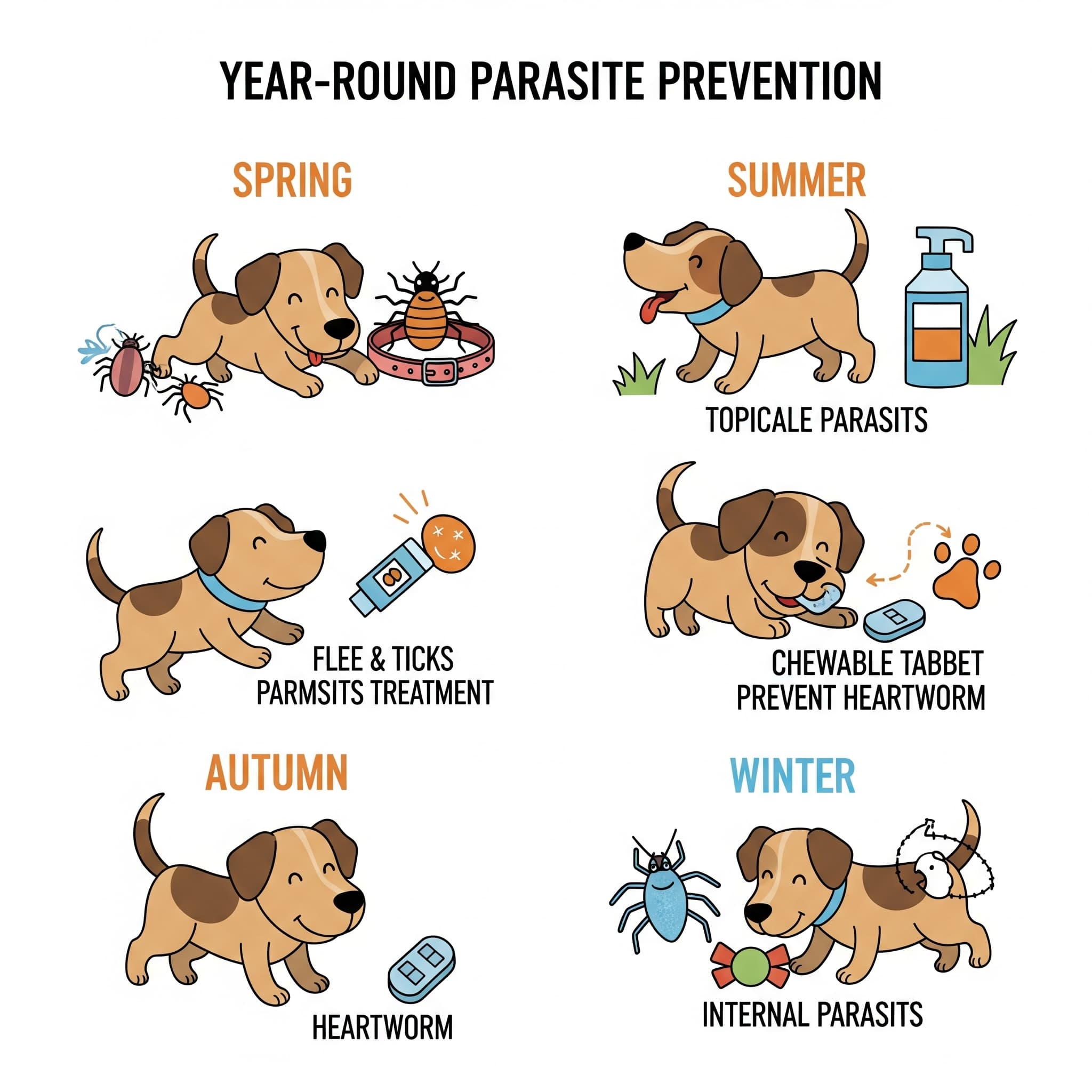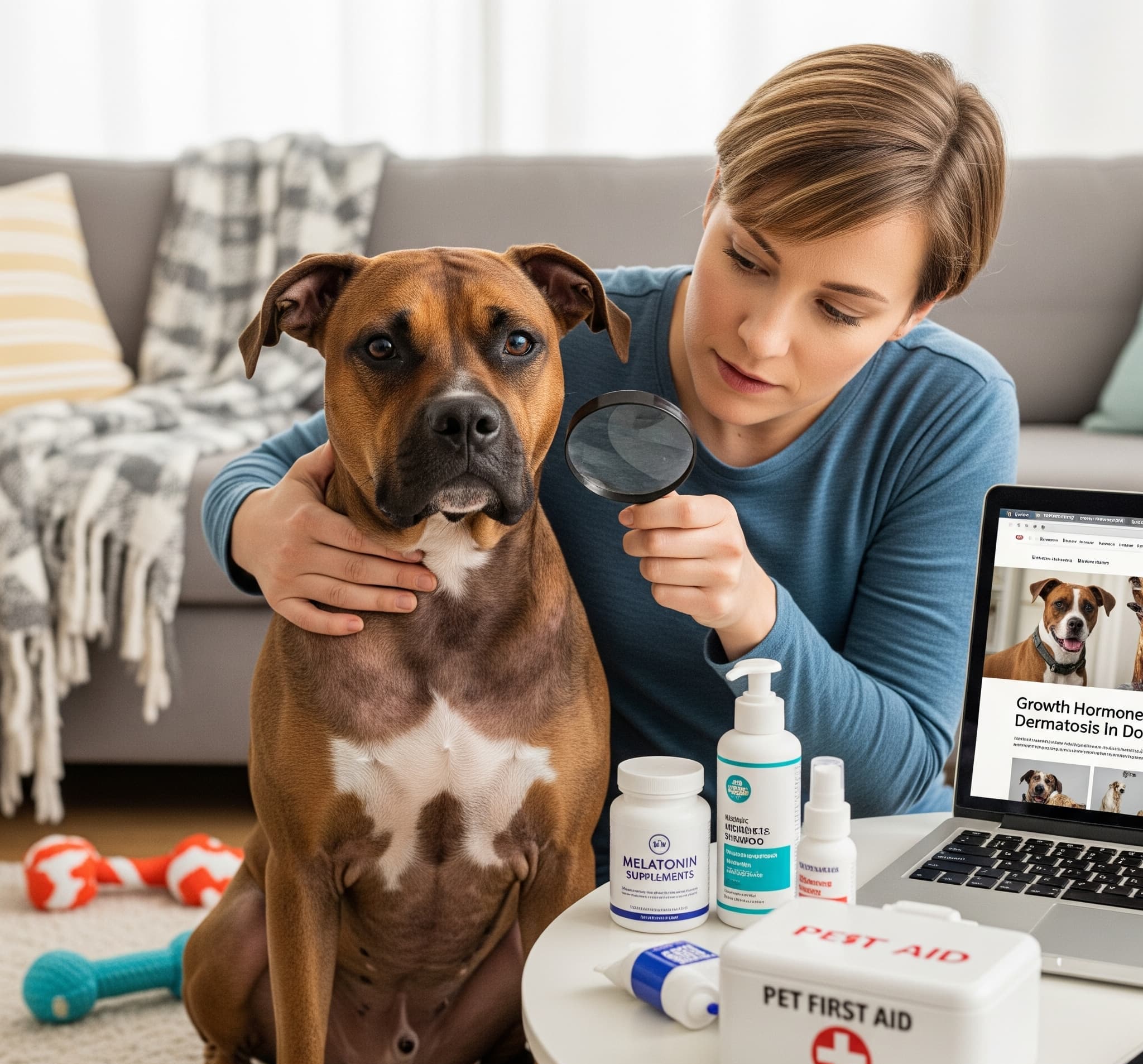Best Parasite Prevention for Dogs All Year
Keep your dog healthy with year-round parasite prevention. Learn the best methods, schedules, and products to protect against fleas, ticks, and worms.
Introduction
Every dog owner worries about parasites. These tiny creatures can make your furry friend sick and uncomfortable. The good news? You can stop parasites before they start with the right prevention plan.
Parasites don’t take breaks. Fleas, ticks, and worms are active all year long. That’s why your dog needs protection every single month. This guide will show you exactly how to keep your pet safe and healthy.
To help you navigate this complete guide and quickly find the information most relevant to your needs, here are the key sections we’ll explore:
- Why Year-Round Protection Matters
- Common Parasites That Threaten Your Dog
- Best Prevention Products and Methods
- Monthly Prevention Schedule Made Simple
- Frequently Asked Questions About Dog Parasite Prevention
Why Year-Round Protection Matters
Many pet owners think parasites only come out in warm weather. This is wrong. Parasites are sneaky and can survive in cold months too.
Fleas live in your house where it’s warm. They hide in carpets, furniture, and bedding. Even when it’s freezing outside, fleas keep breeding indoors. One flea can lay 50 eggs per day. In just 30 days, you could have thousands of fleas in your home.
Ticks are tough creatures. Some types stay active even when there’s snow on the ground. They wait in tall grass and bushes for your dog to walk by. Just one tick bite can spread serious diseases like Lyme disease.
Intestinal worms are another worry. Dogs can pick up worm eggs from the ground, other animals, or contaminated water. These eggs don’t die in winter. They wait until conditions are right to hatch.
Year-round prevention stops problems before they start. It’s much easier and cheaper than treating a sick dog. Plus, some parasites can spread to humans. Protecting your dog protects your whole family.
Common Parasites That Threaten Your Dog
Understanding your enemy helps you fight better. Here are the main parasites that target dogs:
Fleas are tiny jumping insects that feed on blood. They cause itching, scratching, and skin problems. Severe flea infestations can even cause anemia in small dogs or puppies.
Ticks attach to your dog’s skin and drink blood for days. They’re dangerous because they spread diseases. Rocky Mountain spotted fever, ehrlichiosis, and Lyme disease all come from tick bites.
Heartworms live in the heart and lungs. Mosquitoes spread them from dog to dog. Heartworm disease is deadly if not treated. Prevention is much safer than trying to cure this disease.
Roundworms are the most common intestinal parasite in dogs. Puppies often get them from their mothers. Adult dogs pick them up from contaminated soil or prey animals.
Hookworms attach to the intestinal wall and feed on blood. They can cause anemia and digestive problems. Dogs usually get them by walking on contaminated ground.
Whipworms live in the large intestine. They’re hard to detect but cause diarrhea and weight loss. Dogs get infected by eating contaminated soil or water.
Best Prevention Products and Methods
The market offers many parasite prevention options. Here’s what works best:
Monthly oral medications are very effective. Products like Heartgard Plus prevent heartworms and treat intestinal parasites. Nexgard kills fleas and ticks. Many vets recommend these because they’re easy to give and work well.
Topical treatments go on your dog’s skin between the shoulder blades. Frontline and Advantage are popular brands. These products spread over the skin and kill parasites on contact.
Flea and tick collars provide long-lasting protection. Seresto collars work for 8 months. They’re convenient but may not be strong enough for heavy parasite areas.
Combination products fight multiple parasites at once. Simparica Trio prevents heartworms, kills fleas and ticks, and treats intestinal worms. This makes prevention simpler.
Natural options include diatomaceous earth and essential oils. These are gentler but less effective than chemical products. They work best alongside other prevention methods.
Your vet can help you choose the right products. Consider your dog’s size, age, health, and lifestyle. Dogs that spend lots of time outdoors need stronger protection.
Remember to buy prevention products from trusted sources. Fake products sold online may not work or could harm your pet.
Monthly Prevention Schedule Made Simple
Consistency is key to successful parasite prevention. Here’s an easy schedule to follow:
Every month on the same date, give your dog their heartworm prevention medication. Many products also prevent intestinal worms. Set a phone reminder so you never forget.
Apply flea and tick prevention according to the product instructions. Most topical treatments last 30 days. Oral medications may work for 1-3 months depending on the brand.
Check your dog’s body weekly for ticks and fleas. Look especially around the ears, neck, and legs. Remove any ticks you find with tweezers.
Keep your yard clean by removing standing water where mosquitoes breed. Cut grass short and remove leaf piles where ticks hide.
Wash your dog’s bedding in hot water every few weeks. Vacuum carpets and furniture regularly. This removes flea eggs and larvae.
Schedule vet checkups twice a year. Your vet will test for heartworms and check stool samples for intestinal parasites.
Some months need extra attention. Spring and fall are peak tick seasons. Summer brings more fleas and mosquitoes. But don’t let your guard down in winter. Indoor parasites stay active all year.
Frequently Asked Questions About Dog Parasite Prevention
What happens if I miss a dose of prevention medication?
Give the missed dose as soon as you remember. Then continue with the normal schedule. If you’re more than a few days late, call your vet. They may want to test your dog before restarting prevention.
Can puppies take parasite prevention medications?
Yes, but age matters. Most heartworm preventions are safe for puppies 6 weeks and older. Flea and tick products have different age requirements. Always check with your vet before giving any medication to young puppies.
Are there side effects from prevention medications?
Most dogs tolerate prevention medications very well. Rare side effects include vomiting, diarrhea, or lethargy. Serious reactions are extremely uncommon. The benefits far outweigh the small risk of side effects.
How much does year-round prevention cost?
Prevention costs much less than treating parasite-related diseases. Expect to spend $100-300 per year depending on your dog’s size and the products you choose. Compare this to thousands of dollars for heartworm treatment.
Can I use human insect repellent on my dog?
Never use human insect repellents on dogs. DEET and other chemicals can poison pets. Stick to products made specifically for dogs. They’re formulated to be safe for your pet’s skin and size.
Conclusion
Protecting your dog from parasites doesn’t have to be complicated. The key is staying consistent with year-round prevention. Choose products that fit your lifestyle and budget. Work with your vet to create the best plan for your pet.
Remember, prevention is always better than treatment. A small investment in monthly protection can save you thousands in vet bills later. More importantly, it keeps your beloved companion healthy and comfortable.
Don’t wait for parasite season to start your prevention plan. Begin today and give your dog the protection they deserve all year long.
Ready to start your dog’s parasite prevention plan? Talk to your veterinarian this week about the best products for your pet. Your dog’s health is worth the investment!




Post Comment